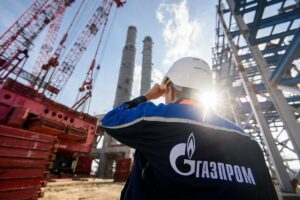
Pumping capacity via the Ukrainian gas-transit corridor has held at the previous minimum level on Thursday, and it remains 50% below the booking level under the long-term contract of 109 million cubic meters of gas per day, while the Yamal-Europe gas pipeline is still not in use.
Booking capacity of Gazprom for gas transit via Ukraine on Thursday, February 17, is 50.6 million cubic meters compared to Wednesday’s updated booking capacity of 51.6 million cubic meters, according to data of the Gas Transmission System Operator of Ukraine.
Among the gas-export pipelines, Gazprom primarily loads Nord Stream at 170 million cubic meters per day, and then loads the Ukrainian gas-transit corridor, thereby leaving the Yamal-Europe gas pipeline in a closing or balancing role. Gazprom again did not book capacity via Yamal-Europe on February 17, and direct flow along the pipeline ceased on December 21.
The presence of unclaimed gas-transit capacity in the list of transit alternatives this winter demonstrates the baselessness of the claims that the lack of Gazprom’s reserves in underground gas storage (UGS) facilities in Europe has been causing rises in prices. Reserves in underground gas storages should, if necessary, compensate for the lack of supplies via gas pipelines, though Gazprom has large transit possibilities in reserve.
It is already possible to talk in general about the heating season concluding, as winter has been rather mild in Europe this year, with the average temperature in February being two-and-a-half degrees warmer than the previous year. According to forecasts, the week of February 14 to 20 should be two-and-a-half degrees warmer than the previous week of February 7 to 13.
Electricity generation from renewable sources in Europe has been rising solidly each day this week. Wind generation contributed 17.2% to electricity generation in the week of February 7 to 13 in the region following 16% in the week of January 31 to February 6, and it rose to 28.6% on Wednesday, which was the highest figure since March 2021, according to data from the WindEurope association.
The level of gas reserves in underground storage facilities in Europe following the results of the gas day on February 15 dropped to 32.22% on Wednesday morning. This was 12.5 percentage points below the average for the past five years, according to Gas Infrastructure Europe. During the first 15 days of February, gas consumption from UGS facilities exceeded the average level over the past five years by 25%.
Gas flow from LNG terminals into the European gas-transit system in February 2022 should double compared to the level of February 2021. Average capacity utilization of regasification terminals in February is 64%.
The price of gas for Thursday delivery at the benchmark European trading platform, the Dutch TTF gas hub, is $806 per thousand cubic meters, averaging $905 per thousand cubic meters since the beginning of February.

Gazprom has booked the entire additional transit capacity offered via Ukraine for July at June’s volume, according to the monthly auction results on the Regional Booking Platform (RBP).
Gazprom on Monday booked additional transit capacity for July on the RBP, having requested 15 million cubic meters per day of the 15 million cubic meters per day offered, which was slightly less than the 14.2 million cubic meters per day booked at the respective auctions for February, March, and April. The volume was the same as the 15 million cubic meters per day booked for May and June, respectively.
Russia’s state-owned gas company has a long-term booking capacity of 40 billion cubic meters via Ukraine for 2021 at 109 million cubic meters per day, having booked an additional 15 million cubic meters per day at the auction for a total of 124 million cubic meters per day.
Gazprom in June has been pumping an average of 124 million cubic meters per day via Ukraine at the fully booked volume.
Europe at this time has sharply boosted its consumption of the blue fuel. Global supplies of LNG, as well as pipeline gas from Russia, are at their highest, though thus far this has not allowed for starting mass pumping into underground storage facilities in preparation of the upcoming winter.